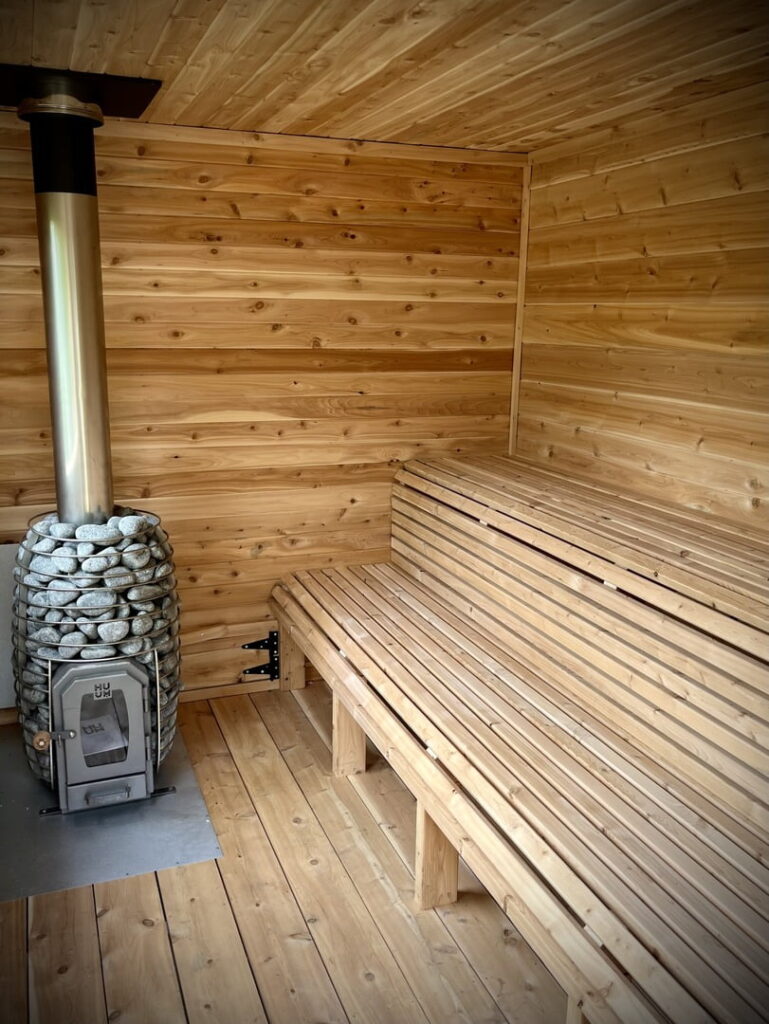Wood-Burning Stoves vs. Electric Saunas: Which is Right for You?
Are you in the market for a custom sauna but torn between a wood-burning stove and an electric sauna? Understanding the differences, benefits, and cons of each option is crucial for making an informed decision. In this article, we’ll break down everything you need to know about wood-burning stoves versus electric saunas to help you choose the perfect sauna experience.
What is a Wood-Burning Stove Sauna?
A wood-burning stove sauna is a traditional sauna that uses wood as a fuel source to heat the sauna room. This type of sauna offers an authentic and rustic experience, complete with the sound and aroma of burning wood.

Benefits of Wood-Burning Stoves
1. Authentic Sauna Experience: Wood-burning stoves provide a traditional sauna experience that many enthusiasts cherish. The crackling fire, the aroma of burning wood, and the gentle, natural heat create an ambiance that’s hard to replicate.
2. Higher Heat Levels: These stoves can reach higher temperatures compared to electric saunas, offering a more intense and invigorating experience. For those who prefer a hot and steamy environment, wood-burning stoves are ideal.
3. Off-Grid Capability: Wood-burning saunas don’t require electricity, making them perfect for remote locations. Whether it’s a cabin in the woods or a backyard retreat, you can enjoy a sauna experience without the need for an electrical connection.
4. Aesthetic Appeal: The visual and auditory elements of a wood fire add to the overall sauna experience. The sight of flames and the sound of crackling wood enhance relaxation and create a rustic, charming atmosphere.
Cons of Wood-Burning Stoves
1. Maintenance Requirements: Wood-burning stoves require regular maintenance, including cleaning out ashes and ensuring proper ventilation. This can be time-consuming and requires a commitment to upkeep.
2. Longer Startup Time: Unlike electric saunas, which can be turned on with the flip of a switch, wood-burning stoves need time to heat up. This means planning ahead and starting the fire in advance of your sauna session.
3. Environmental Impact: Burning wood releases smoke and particulate matter into the air, which can have environmental consequences. While the use of sustainable, locally-sourced wood can mitigate some impact, it remains a consideration.
What is an Electric Sauna?
An electric sauna uses an electric heater to warm the sauna room. This modern option offers convenience and ease of use, making it a popular choice for many sauna enthusiasts.
Benefits of Electric Saunas
1. Convenience and Ease of Use: Electric saunas offer unmatched convenience. They can be turned on with a simple switch and reach the desired temperature quickly. This makes them ideal for busy individuals who want to enjoy a sauna session without extensive preparation.
2. Low Maintenance: Electric sauna heaters require minimal maintenance compared to wood-burning stoves. There are no ashes to clean or wood to store, making them a hassle-free option.
3. Precise Temperature Control: Electric heaters often come with precise temperature controls, allowing users to easily set and maintain their preferred heat levels. This feature is particularly beneficial for those who like to customize their sauna experience.
4. Environmentally Friendly Options: Modern electric saunas can be powered by renewable energy sources, making them a greener choice. Solar panels or other sustainable power options can reduce the environmental footprint of your sauna.
Cons of Electric Saunas
1. Dependence on Electricity: Electric saunas require a reliable power source, which can be a limitation in remote areas or during power outages. This dependence on electricity can also lead to higher operating costs.
2. Less Authentic Experience: While electric saunas provide efficient heating, they lack the traditional charm of a wood-burning stove. The absence of a real fire and the associated sensory experiences can be a drawback for some users.
3. Higher Initial Cost: The installation of electric saunas can be more expensive, particularly if additional electrical work is needed. However, this cost is often offset by lower maintenance expenses over time.
Wood-Burning Stoves vs. Electric Saunas
Choosing between a wood-burning stove and an electric sauna ultimately comes down to personal preference and specific needs. If you value an authentic, traditional experience and don’t mind the maintenance, a wood-burning stove might be the perfect choice. On the other hand, if convenience, low maintenance, and precise temperature control are your priorities, an electric sauna is likely the better option.
At Brookstone Nordic Saunas, we specialize in custom saunas that cater to your preferences. Whether you opt for a wood-burning stove or an electric sauna, our commitment to sustainable materials and luxury experiences ensures that you’ll enjoy the best of both worlds. Contact us today to learn more about our bespoke sauna solutions and start your journey to ultimate relaxation.
